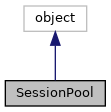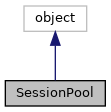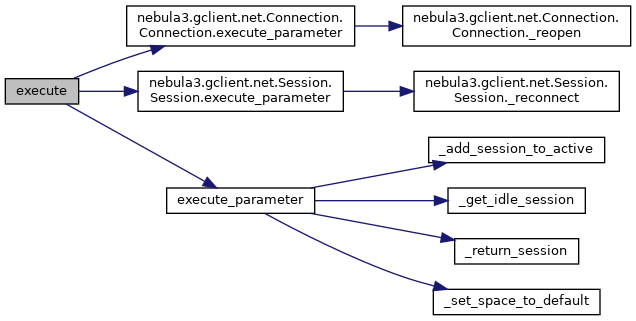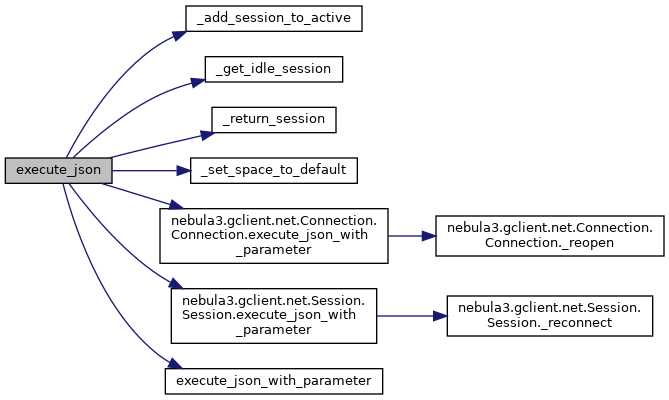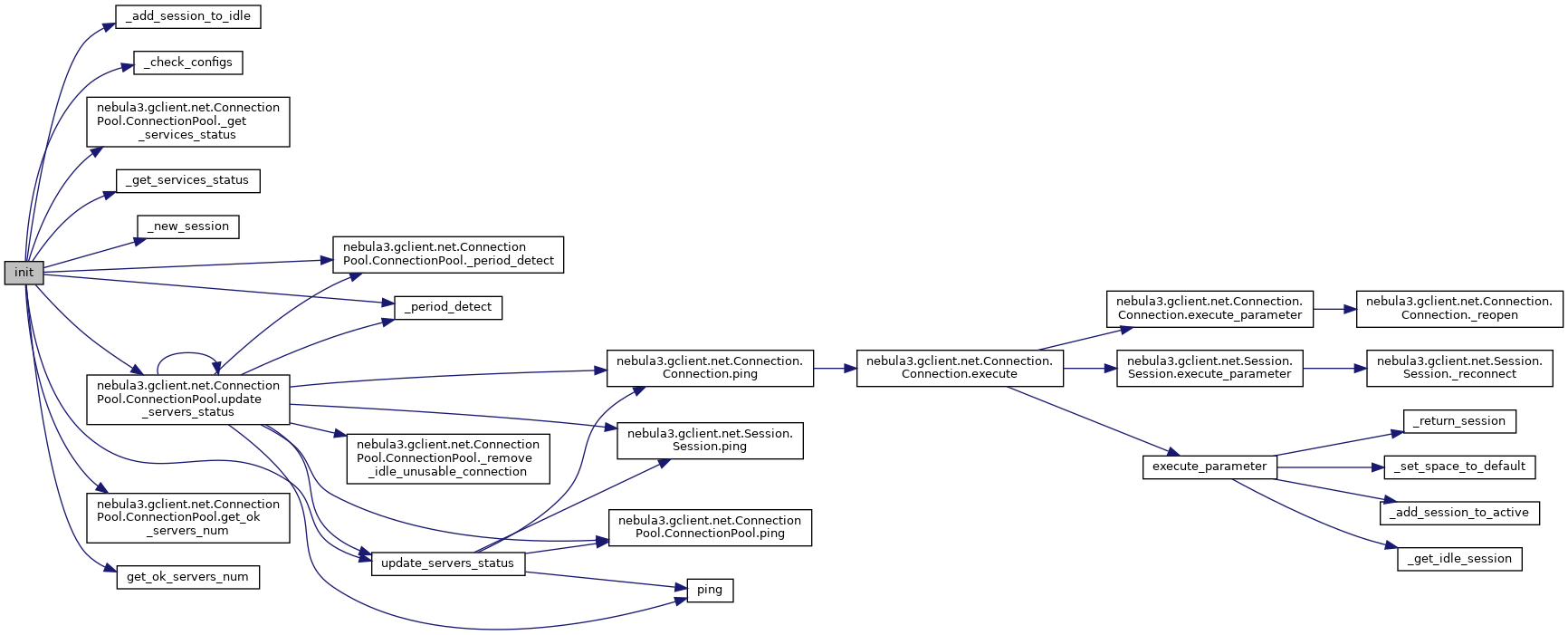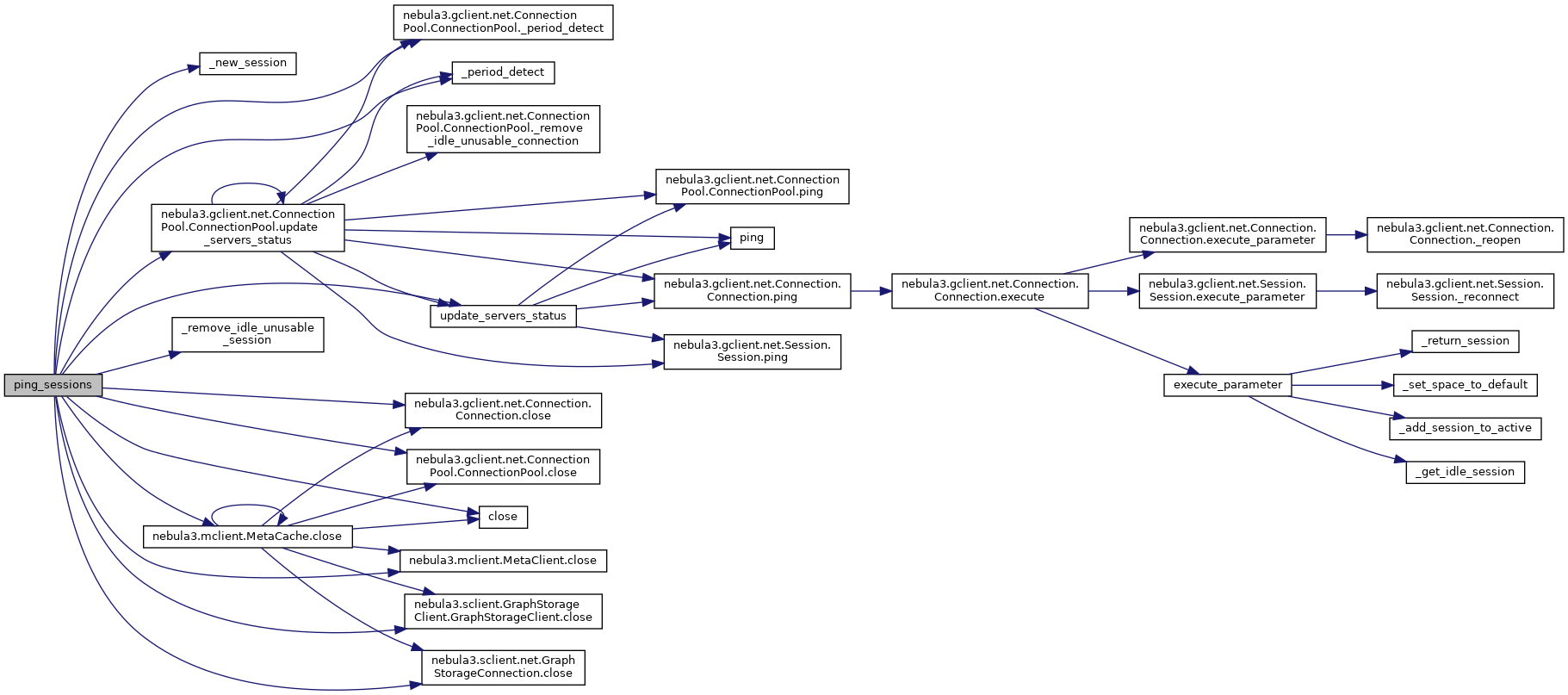SessionPool Class Reference
 Inheritance diagram for SessionPool:
Inheritance diagram for SessionPool: Collaboration diagram for SessionPool:
Collaboration diagram for SessionPool:Public Member Functions | |
| def | __init__ (self, username, password, space_name, addresses) |
| def | __del__ (self) |
| def | init (self, configs) |
| def | ping (self, address) |
| def | execute (self, stmt) |
| def | execute_parameter (self, stmt, params) |
| def | execute_json (self, stmt) |
| def | execute_json_with_parameter (self, stmt, params) |
| def | close (self) |
| def | get_ok_servers_num (self) |
| def | update_servers_status (self) |
| def | ping_sessions (self) |
Static Public Attributes | |
| int | S_OK = 0 |
| int | S_BAD = 1 |
Detailed Description
Definition at line 26 of file SessionPool.py.
Member Function Documentation
◆ close()
| def close | ( | self | ) |
log out all sessions and close all connections :return: void
Definition at line 266 of file SessionPool.py.
 Here is the caller graph for this function:
Here is the caller graph for this function:◆ execute()
| def execute | ( | self, | |
| stmt | |||
| ) |
execute the given query Notice there are some limitations: 1. The query should not be a plain space switch statement, e.g. "USE test_space", but queries like "use space xxx; match (v) return v" are accepted. 2. If the query contains statements like "USE <space name>", the space will be set to the one in the pool config after the execution of the query. 3. The query should not change the user password nor drop a user. :param stmt: the query string :return: ResultSet
Definition at line 136 of file SessionPool.py.
 Here is the call graph for this function:
Here is the call graph for this function: Here is the caller graph for this function:
Here is the caller graph for this function:◆ execute_json()
| def execute_json | ( | self, | |
| stmt | |||
| ) |
execute statement and return the result as a JSON string
Date and Datetime will be returned in UTC
JSON struct:
{
"results": [
{
"columns": [],
"data": [
{
"row": [
"row-data"
],
"meta": [
"metadata"
]
}
],
"latencyInUs": 0,
"spaceName": "",
"planDesc ": {
"planNodeDescs": [
{
"name": "",
"id": 0,
"outputVar": "",
"description": {
"key": ""
},
"profiles": [
{
"rows": 1,
"execDurationInUs": 0,
"totalDurationInUs": 0,
"otherStats": {}
}
],
"branchInfo": {
"isDoBranch": false,
"conditionNodeId": -1
},
"dependencies": []
}
],
"nodeIndexMap": {},
"format": "",
"optimize_time_in_us": 0
},
"comment ": ""
}
],
"errors": [
{
"code": 0,
"message": ""
}
]
}
:param stmt: the ngql
:return: JSON string
Definition at line 179 of file SessionPool.py.
 Here is the call graph for this function:
Here is the call graph for this function:◆ execute_parameter()
| def execute_parameter | ( | self, | |
| stmt, | |||
| params | |||
| ) |
execute statement :param stmt: the query string :param params: parameter map :return: ResultSet
Definition at line 150 of file SessionPool.py.
 Here is the call graph for this function:
Here is the call graph for this function: Here is the caller graph for this function:
Here is the caller graph for this function:◆ get_ok_servers_num()
| def get_ok_servers_num | ( | self | ) |
get the number of the ok servers :return: int
Definition at line 281 of file SessionPool.py.
 Here is the caller graph for this function:
Here is the caller graph for this function:◆ init()
| def init | ( | self, | |
| configs | |||
| ) |
init the session pool :param username: the username of the session :param password: the password of the session :param space_name: the space name of the session :param addresses: the addresses of the servers :param configs: the config of the pool :return: if all addresses are valid, return True else return False.
Definition at line 72 of file SessionPool.py.
 Here is the call graph for this function:
Here is the call graph for this function:◆ ping()
| def ping | ( | self, | |
| address | |||
| ) |
check the server is ok :param address: the server address want to connect :return: True or False
Definition at line 116 of file SessionPool.py.
 Here is the caller graph for this function:
Here is the caller graph for this function:◆ ping_sessions()
| def ping_sessions | ( | self | ) |
ping all sessions in the pool
Definition at line 309 of file SessionPool.py.
 Here is the call graph for this function:
Here is the call graph for this function:◆ update_servers_status()
| def update_servers_status | ( | self | ) |
update the servers' status
Definition at line 301 of file SessionPool.py.
 Here is the call graph for this function:
Here is the call graph for this function: Here is the caller graph for this function:
Here is the caller graph for this function:The documentation for this class was generated from the following file:
- nebula3/gclient/net/SessionPool.py
